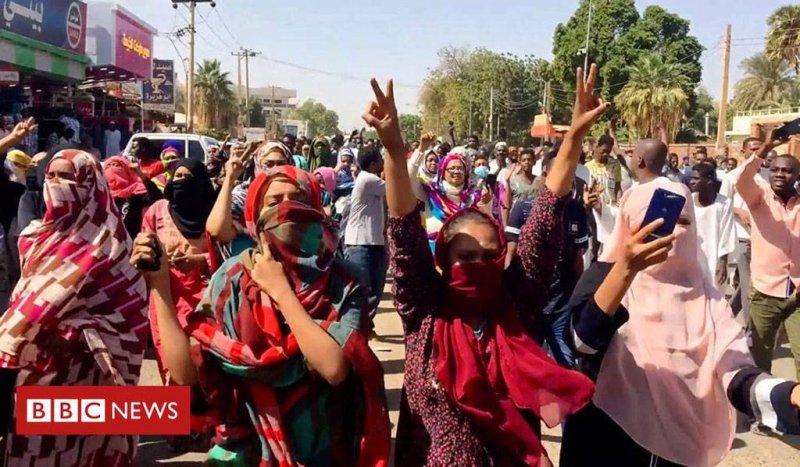Hundreds of Sudanese citizens took to the streets of the nation’s capital Khartoum earlier this month to join women-led protests – rejecting the state of emergency recently declared by President Omar al-Bashir, and celebrating the struggle of Sudanese women on the annual International Women’s Day anniversary.
The role of Sudanese women in anti-Bashir protests has been particularly noticeable since they began last December in Africa’s third largest state – sparked by new economic measures announced by the government which led to the tripling of the price of bread. The protests have since escalated their demands to the resignation of President Bashir – in power since 1989 following an Islamist-backed military coup.
Following months of weekly protests, Bashir responded to the ongoing crisis by ordering a set of extraordinary measures on Feb 22: including a year-long state of emergency, the establishment of emergency courts, and the proscription of unlicensed gatherings.
Honouring their struggle
There has been little sign so far however of Bashir’s latest measures succeeding in deterring protesters, who joined renewed protests in early March in Khartoum and Omdurman and raised slogans condemning his 30-year rule. According to one eyewitness who attended the protests, “women led the demonstrations but were met by security personnel who intercepted many of the protests.”
The latest marches were called by the ‘Freedom and Change’ coalition, a political alliance which has spearheaded the recent wave of demonstrations. Calling on citizens to take to the streets “in support of women” on International Women’s Day, the organisers invited “our people to honour the Sudanese mothers who have lost their children in our struggle.”
Another participant grouping, the ‘Sudanese Professionals Association’ (SPA), titled the protests “the Sudanese women’s procession” – in honour of their role since the start of the protests and “in commemoration of their struggle”.
Mohammed Al-Asbat, the Association’s spokesman, said: “Sudanese woman have remained at the forefront of the battles for freedom and change against the Salvation [ruling party] regime since 1989, and have continued to play this role now by being at the frontlines of the protests.”
He added: “Sudanese women have paid a hefty price for freedom and justice; for some have been subjected to live ammunition and rubber bullets, while others have been tortured, beaten and insulted in detention camps, where the security forces continue to hold dozens of protesters.”
A long patriotic role
According to Mariam Sadiq al-Mahdi, vice-president of the opposition National Ummah Party and daughter of prominent opposition figure Sadiq al-Mahdi, the role of Sudanese women in the current protest movement is not a novel development, but an “accumulative offspring of the national and political effort that Sudanese women have offered since Sudan’s independence in 1956.”
In a phone conversation with Sky News, al-Mahdi, who has herself been previously detained by security forces during the protests, said: “The Sudanese woman has persisted alongside the man against the injustice and oppression that the Sudanese people have suffered at the hands of the security apparatus.”
She further noted “the participation of women in all the opposition protests to al-Bashir’s regime for the last three decades, which prompted security forces to target political and rights’ activists during the past few years.”
Nonetheless, government repression has not stopped Sudanese women from playing “an influential role in documenting the violations of security forces against protesters,” al-Mahdi said, “by videoing them from their smartphones from locations that allow them to capture the movement of protesters and the surveillance of security personnel.”
“Ululations”… a distinctive feature of the protests
Following the example of the 2011 Arab Spring, Sudanese activists have made extensive use of social media to raise awareness of their cause. Sudanese activists launched the Twitter handle #Women_detainees_procession on the 10th of February in solidarity with women detainees in Sudanese prisons. Simultaneously, hundreds of protesters attended a unified demonstration which proceeded to the women’s prison in Omdurman (west of the capital Khartoum), demanding the release of prisoners.
Most notably perhaps has been the distinctive adoption of ‘ululations’ by protesters which have become a defining hallmark of the protests. Women participants have lit up the anti-Bashir protests, and demonstrations launched from women’s universities (particularly from the Ahfad University for Women in Omdurman) have become a regular occurrence – with female students answering the call by the Sudanese Professionals Association to join the ongoing protests in growing numbers.
Notwithstanding being often perceived as isolated within their domestic settings, Sudanese activist Sarah Jadallah says women have been amongst the hardest-hit by Sudan’s political and economic crisis. She told Al-Jazeera: “Women manage their households with economising measures which place a significant pressure on them in light of the rising prices and the weakening purchase power of the [Sudanese] Pound. They work as servants, transporting schoolchildren, selling tea and food. These are low-income jobs, which encourage them to protest.”
The events of Thursday night nonetheless saw security forces fire tear gas to disperse protesters in Northern Khartoum – while at the same time talks headed by President Bashir were held with political parties close to the ruling National Congress. Bahr Idris, one of the leaders of the parties participating in the talks, said the discussions explored “the importance of returning [to] an environment conducive to talks, by releasing political prisoners.”
In the week following Bashir’s declaration of a state of emergency, more than 900 protesters have so far been referred to emergency courts for participating in marches, according to state media, with many receiving prison sentences ranging between two weeks and five years.
Raseef22 is a not for profit entity. Our focus is on quality journalism. Every contribution to the NasRaseef membership goes directly towards journalism production. We stand independent, not accepting corporate sponsorships, sponsored content or political funding.
Support our mission to keep Raseef22 available to all readers by clicking here!
Interested in writing with us? Check our pitch process here!





